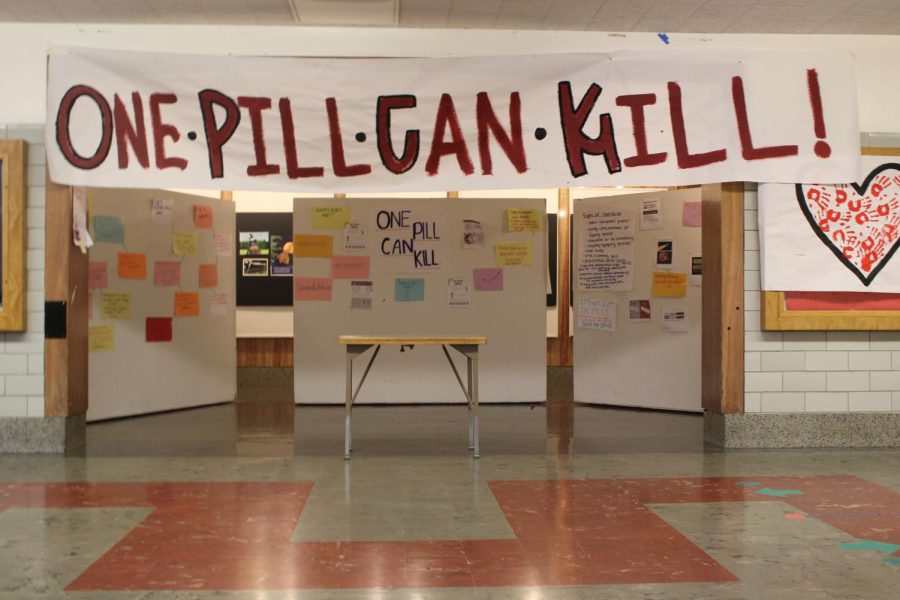Drug and alcohol resources at Lincoln
One pill can kill sign hung over the laced drug awareness display in Lincoln’s main hall.
When students walked into Lincoln during the month of March, the message on a large painted sign was clear: one pill can kill. The main hallway display was a response to the deaths of two Portland teenagers who were suspected to have overdosed on blue fentanyl-laced pills. The display aimed to teach students about the dangers of pills and other substances laced with fentanyl. Cindy Nordberg, Lincoln’s new Drug and Alcohol Counselor, is a source for education and counseling on the topic of drugs and alcohol.
“My whole purpose here is to aid in education and resources for students struggling with substance abuse…I can provide them education[and]I can provide them counseling,” said Nordberg. “And if they need treatment, I can provide that for them.”
A Cardinal Times poll showed that 45% of Lincoln students said they would go to another student over a counselor or teacher for help. Many also said they had worried about seeking help due to stigma or worries about the confidentiality of Lincoln’s resources. As a Lincoln staff member, Nordberg is a mandatory reporter. This means a student would have to threaten to hurt themselves or others for her to break confidentiality surrounding information shared with her.
“Substance abuse is protected with an extra layer. There’s a lot that you can share with me that I can keep confidential,” said Nordberg. “If you’re scared to have family members know, you can do a meet and greet and there are resources to meet confidentially prior to parents getting involved.”
Nordberg wants students to know that addiction is a complicated disease that can have many contributing factors including genetics, mental health and environment. She emphasizes that there are plenty of resources available for treatment.
Student teacher Brianna Estrada has been teaching for Dr. Timm Goldhammer’s sophomore health class since January, and took over full time as a substitute in February. She stepped into her role as substitute during the drugs and alcohol unit, one that she thinks is vital to high schoolers’ education.
“I think it’s incredibly important,” said Estrada. “This might be the only time [students] are exposed to this information. To have unbiased academic knowledge sets them up for more success.”
Many Lincoln students are exposed to this topic during their health class, and Estrada believes a more resource-oriented class could benefit students greatly.
“I think the curriculum design was fairly surface level and focused a lot on the potential dangers of drug use, which is important. I wish it had provided more information about resources,” said Estrada.
Because of this, Estrada believes Nordberg is a uniquely valuable resource for Lincoln students.
“Ms. Norberg has a skillset that will save lives and protect futures,” Estrada said. “The more exposure [students] have to this resource the better.”
For students looking for more information on drugs and alcohol, or a place to get treatment resources, Nordberg is in the counseling office every Wednesday. Students can contact Nordberg directly or through a confidential self-referral form found on posters throughout Lincoln, or through this link. Outside of Lincoln, students can utilize crisis hotlines like the Crisis Call Center (1-800-273-TALK) or the Substance Abuse and Mental Health Services Administration (SAMHSA) helpline (1-800-662-HELP) for immediate counseling.











